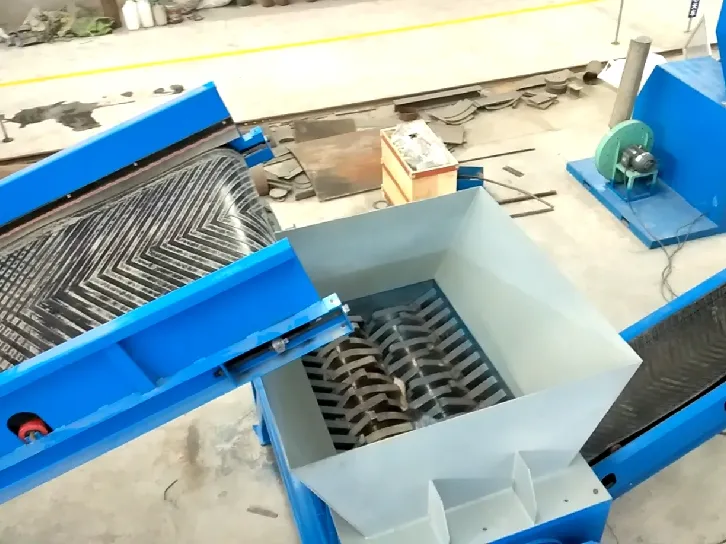

Desemba . 04, 2024 07:38 Back to list
The Importance of Plastic and Metal Shredders in Waste Management
In an era where environmental concerns are at the forefront of public consciousness, the management of waste—particularly plastics and metals—has become increasingly crucial. Among the various technologies employed to address these issues, plastic and metal shredders play a pivotal role. These machines are essential for recycling processes, helping to reduce the environmental impact of waste while also promoting sustainable practices.
Understanding Plastic and Metal Shredders
Plastic and metal shredders are powerful machines designed to break down large volumes of materials into smaller, more manageable pieces. The shredding process involves the use of sharp blades that cut through plastics and metals, reducing them to flakes or shreds. This is often the first step in recycling, as it makes the materials easier to handle, transport, and process in subsequent stages.
There are different types of shredders available, including single-shaft, double-shaft, and granulators, each suited for specific applications. Single-shaft shredders are ideal for homogeneous materials, while double-shaft shredders are better suited for mixed waste streams. Granulators, on the other hand, are used primarily for producing fine particles from plastic waste. The choice of shredder typically depends on the type of material being processed and the desired output size.
Benefits of Shredding Plastics and Metals
The benefits of utilizing plastic and metal shredders cannot be overstated. First and foremost, shredders facilitate recycling, a process that conserves natural resources, saves energy, and reduces greenhouse gas emissions. For instance, recycling metals requires significantly less energy compared to extracting and processing raw ore. Likewise, recycling plastics can prevent the significant environmental pollution caused by plastic waste.
Moreover, shredding increases the efficiency of waste management. Shredders allow for the compaction of materials, which optimizes space in waste storage facilities and decreases transportation costs. By reducing the volume of waste, shredders make it feasible to collect and transport larger quantities of recyclable materials. This efficiency is particularly important in urban areas where space is limited and waste generation is high.

Environmental Impact and Sustainability
Given the alarming statistics surrounding plastic pollution, particularly in our oceans, the role of shredders in environmental management is crucial. Millions of tons of plastic waste enter the oceans each year, harming marine life and ecosystems. By recycling plastics through shredding, we can transform waste into valuable resources, thereby mitigating the negative impact on the environment.
Additionally, the recycling of metals helps reduce the demand for new metal mining, which often leads to habitat destruction and significant carbon emissions. By using shredders to process scrap metals, recycling facilities can repurpose these materials into new products, promoting a circular economy that prioritizes sustainability.
Challenges and Future Perspectives
Despite the numerous benefits, there are challenges associated with the use of plastic and metal shredders. One major issue is the contamination of recyclable materials. When plastics and metals are mixed with other types of waste, it can hinder the shredding and recycling processes. Therefore, public awareness and proper waste segregation are crucial for maximizing the effectiveness of shredders.
Furthermore, technological advancements continue to shape the recycling landscape. Innovations in shredding technology, such as enhanced blade design and energy-efficient operations, are making shredders more effective and sustainable. As industries strive toward greener practices, the demand for reliable shredders will likely increase.
Conclusion
In conclusion, plastic and metal shredders play an indispensable role in modern waste management and recycling efforts. They not only help in reducing the environmental footprint of industrial processes but also facilitate the transition towards a more sustainable future. By investing in and utilizing these technologies, we can make significant strides in managing waste, conserving natural resources, and protecting our planet for future generations. As we move forward, it is imperative that we embrace the principles of recycling and sustainability, leveraging machines like shredders to turn waste into a valuable asset.
Latest news
Troubleshooting Common Eddy Separator Problems
NewsJul.04,2025
The Role of Metal Recycling Plants in Circular Economy
NewsJul.04,2025
The Impact of Recycling Line Pickers on Waste Management Costs
NewsJul.04,2025
Safety Features Every Metal Shredder Should Have
NewsJul.04,2025
How Industrial Shredders Improve Waste Management Systems
NewsJul.04,2025
How Cable Granulators Contribute to Sustainable Recycling
NewsJul.04,2025